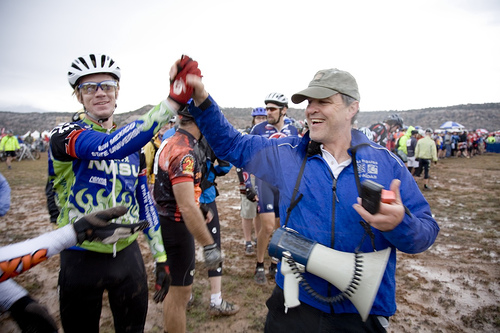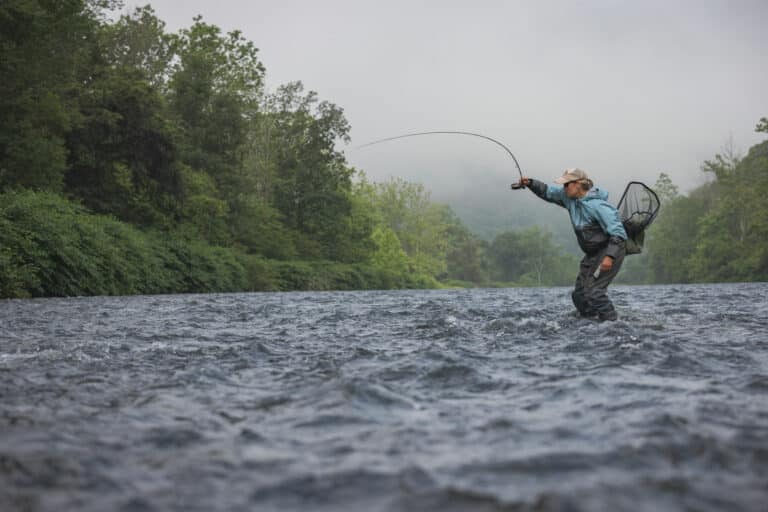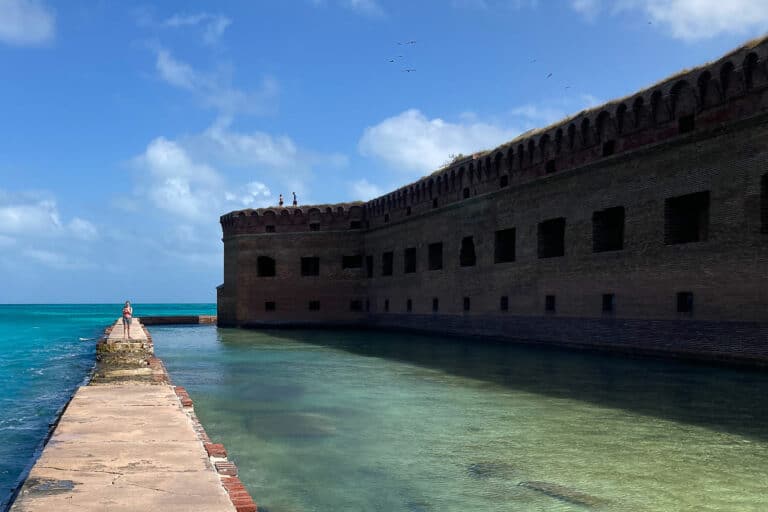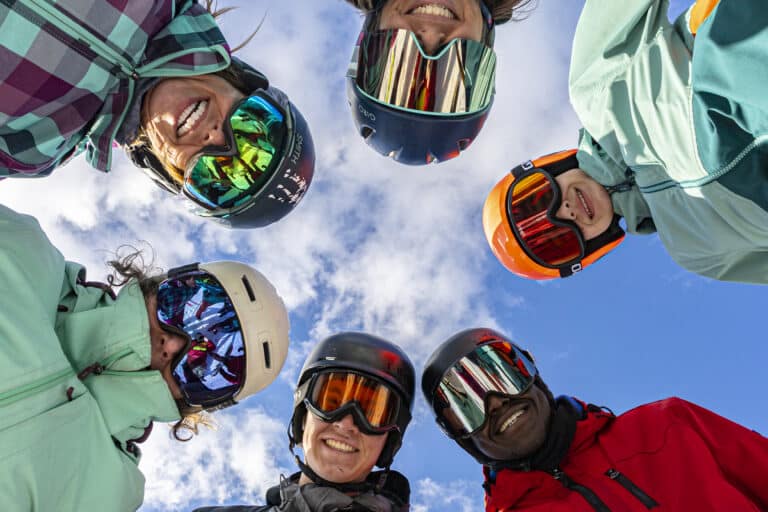Because Laird Knight’s dad was an army captain, he learned how to ride a bike when he was 5 years old in Ethiopia. His first mountain bike was a 1983 Ross, Force-1.
Laird started producing mountain bike events in 1983. In 1984, he created the Canaan Mt. Series, now in its 14th year; it is one of the longest running mountain bike race series in the world. He ran one of the first National Off-Rode Bicycle Association (NORBA) sanctioned races on the east coast. He helped establish Davis, W.Va., as an East Coast mountain bike mecca. In 1989, he worked to create the West Virginia Mountain Bike Association (WVMBA).
In 1992, Laird formed Granny Gear Productions, the company responsible for the creation of the 24 Hours of Canaan, the first 24 hour mountain bike team relay race in the country. In 1995, Granny Gear created the 24 Hours of Moab race. The 1996, the Canaan race had over 1,700 participants.
Can you describe what the first five years of mountain biking like?
It’s all about context. The context for me at the beginning was all about the mountain bike community that was budding on the East Coast. In the earliest days it was mostly people coming to Davis, W.Va., from other parts of West Virginia, Pittsburgh, Virginia, D.C., and Baltimore.
The reason I started running mountain bike races was because of the camaraderie I felt with other mountain bikers. I lived in Davis, W.Va.,, this little mountain town, and most of the residents were retirees and locals that didn’t care that much for mountain bikers in the first place. Races were a social mechanism. I got to know these guys from Pittsburgh like Barry Jefferies and other guys from D.C. like Matt Marcus and Roger Bird. People came with backgrounds as bike messengers or dirt bikers and BMX-ers. But we were all there to share our excitement over these really amazing bicycles.
That time was in fact the beginning of the sport and everybody knew it. The technology was a big part of it. Every time we got back together somebody would have the latest and greatest bike component or gear and even if you didn’t have it or care that much, you were checking it out. Every new year meant a new upgrade. There was the improvement to cantilever brakes, then suspension, and suddenly hydraulic brakes showed up, and disc brakes, and rear suspension. Bikes got lighter and more expensive. By the late 1990s some of the mountain bikers were even starting to resent how tricked out mountain bikes were becoming. The term “retro grouch” came up somewhere in the early 90s. They were these guys who were fine with what they had, preferring rigid bikes. These retro grouches started taking umbrage with all the new bling.
What drove you to become a race promoter?
I did it for about ten years more or less as a hobby. Those smaller cross-country races in late 80s and early 90s barely paid their way. Usually, if I had anything left over I would take my crew out to a nice restaurant. That dinner would be the sum total or my profit loss statement. It really was a social thing for me, not about making money but at the same time I started Blackwater Bikes in the spring of 83’. I started the Canaan Mountain bike series that fall. The races definitely built the Blackwater brand. That was key because I had this mountain bike shop in the middle of nowhere and the only way I could sell enough bikes was to establish it as a mountain bike destination. That was my whole branding play, having a nicely stocked shop while running the races. On race weekends we would clean out and have to call all our suppliers to restock the following Monday morning. If there was a business angle, to the races, it was to get customers to my shop and spread the Blackwater Bikes name.
Then towards the end of the 90s, my race promoting kind of became a big thing. The National Off-Road Bicycle Association (NORBA) had all these huge races out on the west coast. I finally convinced them to let me run a race. I ran the NORBA Nationals in 1988. We had the largest NORBA Nationals that had ever happened in the history of the organization. We had 440 racers. It was huge and the East Coast racers came out in droves. One of the draws was that everybody was going to get to see the top pros like Ned Overend and Tinker Juarez. The race went off flawlessly.
But I didn’t get to host the race the following year. NORBA was in really bad financial straights. They were supposed to pay all the pros. But a week before the race I called them and they said I would have to pay out of my own pocket. So here I am days before the event and I had no clue what to do. I couldn’t tell these pros I didn’t have their race money so I paid them the money. That was all I had left.
My team submitted our proposal the following year. We had financial support from the state of West Virginia and the local tourism board. We called them after they got it and they said it was better then the proposal submitted for the world championship. But then a month later, they said they wanted to have it in Traverse, Mich., because we were too far away from an airport. I was shocked. The year before we had hosted the largest national mountain bike race ever and nobody had any trouble getting there.
In a way, that experience created 24 hour racing. I had always wanted to take mountain bike racing to the next level; to make it even better than Nationals. I started the Tour of Canaan. It was a multi-day, multi-event stage race. I did that in 1990. Then in the winter of ’90, I started cooking up the idea for 24 hour racing. It was during the award ceremony of the Tour of Canaan in 1992. We hosted it at a nearby ski resort, Timberline Resort. The main lodge room was packed for the award ceremony and I made an announcement. I said, “I have an announcement. Next year I will no longer be running the Tour of Canaan.” The entire room went silent and I said, “In it’s place, I am going to run a new race with an entirely new format. It’s called the 24 Hours of Canaan. It’s a 24-hour mountain bike relay race from 12 noon on Saturday to 12 noon on Sunday.”
The next year was the beginning. We had 36 teams, roughly four to five people per team—180 racers in all. The race went to 88 teams the second year to 208 teams the third year to 340 the next year and I had to begin to turn racers away because I was freaked out that we couldn’t handle them all. For many years after, we turned away hundreds of teams. It was a new format but very simple. Winners placed first, second, and third. That was really what I became known for though later in my career I created a series of 24-hour races with a developed point system. All the point systems were progressive, meaning you always got a disproportionately high number of points for first place and down the line like a bell curve. First place has to be heavily weighted or else it’s too easy for somebody to have one bad race and be out. I researched NASCAR and some other points styled events and duplicated the same curves they used.
Were there any books in particular inspired you as a race promoter?
I read a book when I was living in Boulder, Colo. I don’t even know if the book is still in print and I may botch the title but it was something like… If I had It All To Do Over Again. It was a women who interviewed 50 or so older people on their death beds and posed the question, “If you had it all to do over again, what would you do different?” The point the book made was that nobody had ever wished they’d owned that big house or owned more things. Their answers were always experiential like I wish I had gone to Paris, I wish I had run the Boston marathon, I wished I had kissed so-and-so in high school. It was always about experiences, not things.
When I was starting Blackwater Bikes and beginning to promote races, I was funding everything as a sales rep for my best friend who had a tee shirt printing shop right next to Backwater Bikes. But there was something about selling things that didn’t resonate with me. It wasn’t who I was. I wanted to sell experiences and enrich people’s lives with memories and relationships. That is the philosophical foundation for my race company, Granny Gear Productions. I drilled that into my staff, always. That was what our work was for, to create experiences, friendships, and memories. That was the product, not a race. I would have to say that we succeeded. I feel really good about that.
Do you listen to music while you bike?
I’ve done it before and it doesn’t really do it for me. I think it’s a form of multi-tasking and I agree with all the science that says that multi-tasking is not healthy for your brain. I believe that focusing all that you’re doing on one thing at a time is what you should do. Music wise, I have eclectic tastes. For mountain biking I like hard driving rhythm. My favorite piece of music to play in the last 5 minutes before a race is The Theme for the Common Man by Aaron Copeland. You can’t create more drama before a 24-hour race.
What other sports can improve mountain biking skills?
Some of the best mountain bike racers I’ve come across have been wrestlers. The fitness level demanded by wrestling as well as the mental toughness is unparalleled. And my mountain biking is informed heavily by American football. It makes you tough.
Mountain bike racing also has a lot to do with aerobic endurance. There is nothing that compares in cross-training value as swimming does.
Tell us about your kids.
I’ve got twins; Helen and Rediet and their 14-year-old brother Abel. They’re teenagers. I’m hoping to get Radiet hooked into mountain bike racing this summer. I might take him around to do some of the WVMBA races. He’s an incredible cross-country runner. Ethiopian. I’m hoping he’s going to kick some major booty on the circuit races. He’s got that endurance racer thing going for him.
Do you have plans to put on future races?
I will admit to being a little more than burned out. But I’m tempted all the time. I might. There are some directions I would like to go. I always want to do something new and innovative. The creative aspect of putting on a race is what drives me. I love growing and building things but once I finally get there I get bored and restless. If there is not something new and different I can do to keep pushing outward, I’m not satisfied. With Granny Gear Productions, there was always something new I could add. My favorite thing to do was to go out and design a new racecourse. I’ve only been able to do that so many times. But it was always so much fun to work with what I had and still fit the 24-hour race format. Those were always enjoyable days.
One fantasy I have is to retire to Ethiopia and get a whole bunch of Ethiopian kids on mountain bikes and build a global-caliber mountain bike race team—a force to be reckoned with. That would be a hoot.








